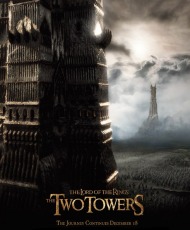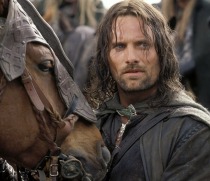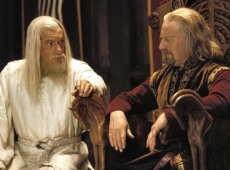The Lord of the
Rings:
The Two Towers |
| |
 |
New Zealand/USA, 2002. Rated PG-13. 179
minutes.
Cast:
Elijah Wood, Ian McKellen, Viggo Mortensen, Sean Astin, Orlando Bloom,
Liv Tyler, John Rhys-Davies, Dominic Monaghan, Billy Boyd, Andy Serkis,
Bernard Hill, Liv Tyler, Christopher Lee, Miranda Otto, Karl Urban, Brad
Dourif, David Wenham, Cate Blanchett, Hugo Weaving
Writers: Fran Walsh, Philippa Boyens, Stephen Sinclair, Peter Jackson;
based on the novel by J.R.R. Tolkien
Music: Howard Shore
Cinematographer: Andrew Lesnie
Producers: Peter Jackson, Barrie M. Osborne, Fran Walsh
Director: Peter Jackson
LINKS
|
 he Fellowship
has broken. One of its members has been murdered by Orcs; another, Gandalf (Ian
McKellen), the wise old wizard, has been left to die in the shadow of Moria.
Young hobbits Merry (Dominic Monaghan) and Pippin (Billy Boyd) have been taken
captive by Orcs and witness the ecological devastation caused by the hand of
the wizard Saruman (Christopher Lee). Human Aragorn (Viggo Mortensen), elf Legolas
(Orlando Bloom), and dwarf Gimli (John Rhys-Davies) are on their path, but must
deal with the ten thousand strong army sent forth by Saruman to destroy the
race of men. The Ring-bearer, Frodo Baggins (Elijah Wood), finds his resistance
to the Ring's power is fading. As he and his friend Sam (Sean Astin) journey
to the center of Mordor, their quest becomes more and more desperate. All the
while, the power of Mordor and Isengard (Saruman's stomping grounds) is growing
more terrible and more potent.
he Fellowship
has broken. One of its members has been murdered by Orcs; another, Gandalf (Ian
McKellen), the wise old wizard, has been left to die in the shadow of Moria.
Young hobbits Merry (Dominic Monaghan) and Pippin (Billy Boyd) have been taken
captive by Orcs and witness the ecological devastation caused by the hand of
the wizard Saruman (Christopher Lee). Human Aragorn (Viggo Mortensen), elf Legolas
(Orlando Bloom), and dwarf Gimli (John Rhys-Davies) are on their path, but must
deal with the ten thousand strong army sent forth by Saruman to destroy the
race of men. The Ring-bearer, Frodo Baggins (Elijah Wood), finds his resistance
to the Ring's power is fading. As he and his friend Sam (Sean Astin) journey
to the center of Mordor, their quest becomes more and more desperate. All the
while, the power of Mordor and Isengard (Saruman's stomping grounds) is growing
more terrible and more potent.
Yep, The Two Towers is just as jolly as the rolling black hills of Mordor.
There's no birthday jubilee in the Shire to look back to. There are no elegant
Elvin houses to keep safe in. There is no charmingly eccentric Bilbo Baggins.
Everywhere is darkness, and that evil could reign over good, that hope could
give out to despair, is a very strong possibility. Audiences don't like that
kind of story. Audiences like the kind of story in which hope is ten thousand
suns beaming down from the end of a dark tunnel. If they care for the characters
enough, all they want for them is a perfectly clear-cut happy ending. Three
hours of uncertainty as to whether the sun will rise again is excruciating if
the audience cares enough for the characters. That's what happens in The
Two Towers. Characters we loved in The Fellowship of the Ring are
now in the midst of outer and inner turmoil, and there's no form of escape,
nothing to ease the darkness save a few hearty jokes.
Funny thing is, with all the darkness in the story, The Two Towers is
still a crowd pleaser.
Why does Peter Jackson manage to keep The Two Towers so enchanting even
when it is immersed in darkness? Because he knows how to manipulate his audiences.
He knows how to hold them engrossed in stories they wouldn't otherwise enjoy.
He and his fellow screenwriters Philippa Boyens, Fran Walsh, and Stephen Sinclair
know how to get them to sympathize with characters that aren't even human.  More
than half of The Two Towers' audience members probably would have never
even considered picking up a book with mythical creatures like hobbits, elves,
and dwarves, yet they're coming in droves to see a movie with and rooting for
those non-human characters. If you think that's a gross overstatement, tell
that to all the teenagers who voted The Fellowship of the Ring as best
movie for the 2002 MTV Movie Awards, and all the average moviegoers who spent
$101.5 million to see The Two Towers in its first five days of release.
The Lord of the Rings has a wide built-in fan base, but not that wide.
More
than half of The Two Towers' audience members probably would have never
even considered picking up a book with mythical creatures like hobbits, elves,
and dwarves, yet they're coming in droves to see a movie with and rooting for
those non-human characters. If you think that's a gross overstatement, tell
that to all the teenagers who voted The Fellowship of the Ring as best
movie for the 2002 MTV Movie Awards, and all the average moviegoers who spent
$101.5 million to see The Two Towers in its first five days of release.
The Lord of the Rings has a wide built-in fan base, but not that wide.
The Lord of the Rings franchise is one that is clearly transcending
all audiences by taking a once-thought inaccessible story and making it accessible
without foregoing intelligence. These are films that entertain and hold their
own amongst classics. But even those classics have their flaws, and The Two
Towers' are more obvious and slightly less forgivable than those of Fellowship.
Different storylines can cause confusion and make the narrative jagged and uneven,
especially when there are new characters to be introduced, newer developments
to be shown, and new conflicts to be dealt with. Peter Jackson, too, can get
caught up in his epic brushstrokes and resort to ineffective storytelling clichés.
Thankfully, those slip-ups are few and far between. What Two Towers lacks
in its predecessor's charm and narrative ease it makes up for in sheer power.
Peter Jackson is playing with his audience's emotions in a way that would've
made Alfred Hitchcock proud, relying on poetic visual storytelling techniques
to hold his audience captive. The opening sequence (an extended version of sorts
of a scene in Fellowship) is just the frosting on the cake.
The cream filling of the cake is the spectacular battle of Helm's Deep, an
event that once was a few paragraphs in Tolkien's prose, which has been developed
into one of the best action sequences ever filmed. When it comes to action,
Jackson is far from perfect (sometimes going for melodramatic sound changes
or camera movements so frantic that the action cannot be seen), but Helm's Deep
soars once he chooses to let the action flow without any added melodrama (and
lots of added humor and visual splendor).
Action and breathtaking visuals (like Viggo Mortensen) may be the film's general
strong points, but long after I left The Two Towers, I remained most
impressed with the portrayal of Frodo (Elijah Wood) being taken (or as someone
else said perfectly, destroyed) by the Ring. Frodo in The Fellowship
of the Ring was made to be almost too nice a guy. Other than using
the Ring on occasion by accident or by means of saving himself, we never see
Frodo corrupted much by the Ring. The signs are there, but Frodo desires more
to rid himself of the Ring and return to the peace of the Shire than anything.
Having that kind of Frodo in mind for a year makes his spiritual disintegration
in The Two Towers all the more frightening. Jackson doesn't fail to draw
parallels between Frodo and Gollum (voiced by Andy Serkis), a CGI character
introduced in The Fellowship of the Ring who owned the One Ring before
it was "stolen" from him. Their relationship in the film is far more intense
than it is in the book, perhaps because we actually now can see Frodo's reaction
to Gollum, see how and why he pities him, and see exactly how Frodo is growing
closer in character to Gollum. One scene shows Frodo caressing the Ring, only
to discover at that same time Gollum is doing the same thing to an invisible
spot on his hand.  This
aspect of the story also gives The Two Towers one of its most memorable
shots.
This
aspect of the story also gives The Two Towers one of its most memorable
shots.
A lot of the effectiveness of Frodo's characterization comes from Elijah Wood's
performance. Who knew he could act? Jackson did; obviously he saw something
in Wood I had missed. Frodo is the epitome of all the characters in Wood's filmography,
the culmination of a career spent playing characters haunted by one hardship
or another. Strip down the frivolous conflicts against space terrors, parental
figures, and Macauley Culkin, and you've got basically the same vulnerable character
fighting against an outside force. Jackson doesn't so much turn the perennial
Elijah Wood role on its head but gives it new dimension and depth (much like
Hitchcock did with the typical Jimmy Stewart role in Vertigo), and, in
turn, Wood gives Frodo more emotion and soul than he did any of his other characters
(even if he does occasionally wind up sounding like a whiny five year old girl).
It is unfortunate that Frodo's partner in his journey, faithful servant Samwise
Gamgee (Sean Astin) has so little to do. Sam remains the same old overprotective
attendant of "Mr. Frodo" with no new developments save for the ability to sprout
vomit-inducing monologues that reek of blatant Oscar masturbation. Astin's performance
is fine, even excellent at points (and the chemistry between him and Wood is
electric), but he's just a victim of another of the movie's flaws--the poor
use of otherwise interesting characters.
One of the book's strongest characters, Éowyn (the perfectly cast Miranda Otto),
niece of King Théoden (Bernard Hill) of Rohan (a realm of men under attack by
Saruman), is thrown in mostly to conjure an unnecessary love triangle between
herself, Aragorn, and elf Arwen (Liv Tyler). Elves, in fact, are used the worst
in this film. Arwen's presence is needless, given that she did not appear anywhere
in the book (though a scene of hers with Aragorn serves as a convenient bathroom
break). A scene involving her and her father Elrond (Hugo Weaving) is powerful
and moving if only for the poetry of the visuals, but had it not been included,
The Two Towers wouldn't have been worse off. As much as I adore Cate
Blanchett, her character (Galadriel), too, should not have been in this film,
and serves only to give information that could have just as easily been given
without her narration.
Gimli the dwarf spends most of his time in The Two Towers drowned in
the punch lines he threatened to give in Fellowship. I guess all can
be forgiven, seeing how Merry and Pippin aren't in tow to be the film's comic
relief, and John Rhys-Davies gives Gimli the dimension missing from the script.
The classic comic duo of Merry and Pippin do cough up laughs (as usual
it's Billy Boyd as Pippin who's the funniest), but they've been regulated to
the rather tedious Ent (ancient talking tree creatures) scenes and forgotten
for most of the film.
Yet the most you can feel for this mistreatment is disappointment that the
screenwriters didn't take the time to give our favorite characters the development
they needed. To the advantage of The Two Towers, the relationship the
audience has with the characters in Fellowship cannot be diminished.
If you loved Sam in Fellowship, you will still love Sam in The Two
Towers. It's that deep relationship the audience holds with these characters
that makes The Two Towers such an intense experience, and probably why
The Return of the King will quite possibly be the most emotionally testing
of all three Lord of the Rings movies.
Review
© January 2003 by AboutFilm.Com and the author.
Images © 2002 New Line Productions, Inc. ™ The Saul Zaentz Company d/b/a
Tolkien Enterprises under license to New Line Productions, Inc. All Rights Reserved.

 More
than half of The Two Towers' audience members probably would have never
even considered picking up a book with mythical creatures like hobbits, elves,
and dwarves, yet they're coming in droves to see a movie with and rooting for
those non-human characters. If you think that's a gross overstatement, tell
that to all the teenagers who voted The Fellowship of the Ring as best
movie for the 2002 MTV Movie Awards, and all the average moviegoers who spent
$101.5 million to see The Two Towers in its first five days of release.
The Lord of the Rings has a wide built-in fan base, but not that wide.
More
than half of The Two Towers' audience members probably would have never
even considered picking up a book with mythical creatures like hobbits, elves,
and dwarves, yet they're coming in droves to see a movie with and rooting for
those non-human characters. If you think that's a gross overstatement, tell
that to all the teenagers who voted The Fellowship of the Ring as best
movie for the 2002 MTV Movie Awards, and all the average moviegoers who spent
$101.5 million to see The Two Towers in its first five days of release.
The Lord of the Rings has a wide built-in fan base, but not that wide.
 This
aspect of the story also gives The Two Towers one of its most memorable
shots.
This
aspect of the story also gives The Two Towers one of its most memorable
shots.
